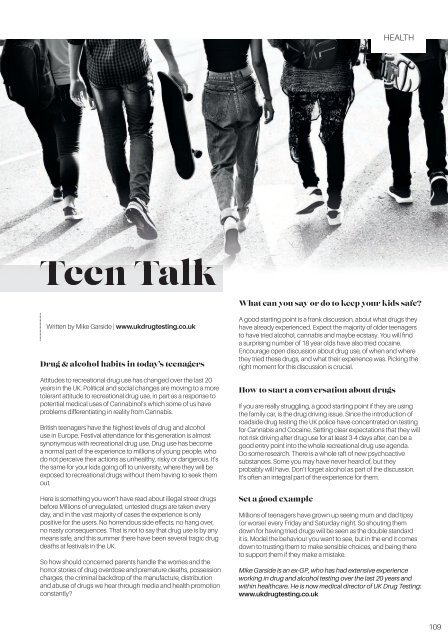You also want an ePaper? Increase the reach of your titles
YUMPU automatically turns print PDFs into web optimized ePapers that Google loves.
HEALTH<br />
Teen Talk<br />
Written by Mike Garside | www.ukdrugtesting.co.uk<br />
Drug & alcohol habits in today’s teenagers<br />
Attitudes to recreational drug use has changed over the last 20<br />
years in the UK. Political and social changes are moving to a more<br />
tolerant attitude to recreational drug use, in part as a response to<br />
potential medical uses of Cannabinol’s which some of us have<br />
problems differentiating in reality from Cannabis.<br />
British teenagers have the highest levels of drug and alcohol<br />
use in Europe. Festival attendance for this generation is almost<br />
synonymous with recreational drug use. Drug use has become<br />
a normal part of the experience to millions of young people, who<br />
do not perceive their actions as unhealthy, risky or dangerous. It’s<br />
the same for your kids going off to university, where they will be<br />
exposed to recreational drugs without them having to seek them<br />
out.<br />
Here is something you won’t have read about illegal street drugs<br />
before Millions of unregulated, untested drugs are taken every<br />
day, and in the vast majority of cases the experience is only<br />
positive for the users. No horrendous side effects, no hang over,<br />
no nasty consequences. That is not to say that drug use is by any<br />
means safe, and this summer there have been several tragic drug<br />
deaths at festivals in the UK.<br />
So how should concerned parents handle the worries and the<br />
horror stories of drug overdose and premature deaths, possession<br />
charges, the criminal backdrop of the manufacture, distribution<br />
and abuse of drugs we hear through media and health promotion<br />
constantly?<br />
What can you say or do to keep your kids safe?<br />
A good starting point is a frank discussion, about what drugs they<br />
have already experienced. Expect the majority of older teenagers<br />
to have tried alcohol, cannabis and maybe ecstasy. You will find<br />
a surprising number of 18 year olds have also tried cocaine.<br />
Encourage open discussion about drug use, of when and where<br />
they tried these drugs, and what their experience was. Picking the<br />
right moment for this discussion is crucial.<br />
How to start a conversation about drugs<br />
If you are really struggling, a good starting point if they are using<br />
the family car, is the drug driving issue. Since the introduction of<br />
roadside drug testing the UK police have concentrated on testing<br />
for Cannabis and Cocaine. Setting clear expectations that they will<br />
not risk driving after drug use for at least 3-4 days after, can be a<br />
good entry point into the whole recreational drug use agenda.<br />
Do some research. There is a whole raft of new psychoactive<br />
substances. Some you may have never heard of, but they<br />
probably will have. Don’t forget alcohol as part of the discussion.<br />
It’s often an integral part of the experience for them.<br />
Set a good example<br />
Millions of teenagers have grown up seeing mum and dad tipsy<br />
(or worse) every Friday and Saturday night. So shouting them<br />
down for having tried drugs will be seen as the double standard<br />
it is. Model the behaviour you want to see, but in the end it comes<br />
down to trusting them to make sensible choices, and being there<br />
to support them if they make a mistake.<br />
Mike Garside is an ex-GP, who has had extensive experience<br />
working in drug and alcohol testing over the last 20 years and<br />
within healthcare. He is now medical director of UK Drug Testing:<br />
www.ukdrugtesting.co.uk<br />
109

















